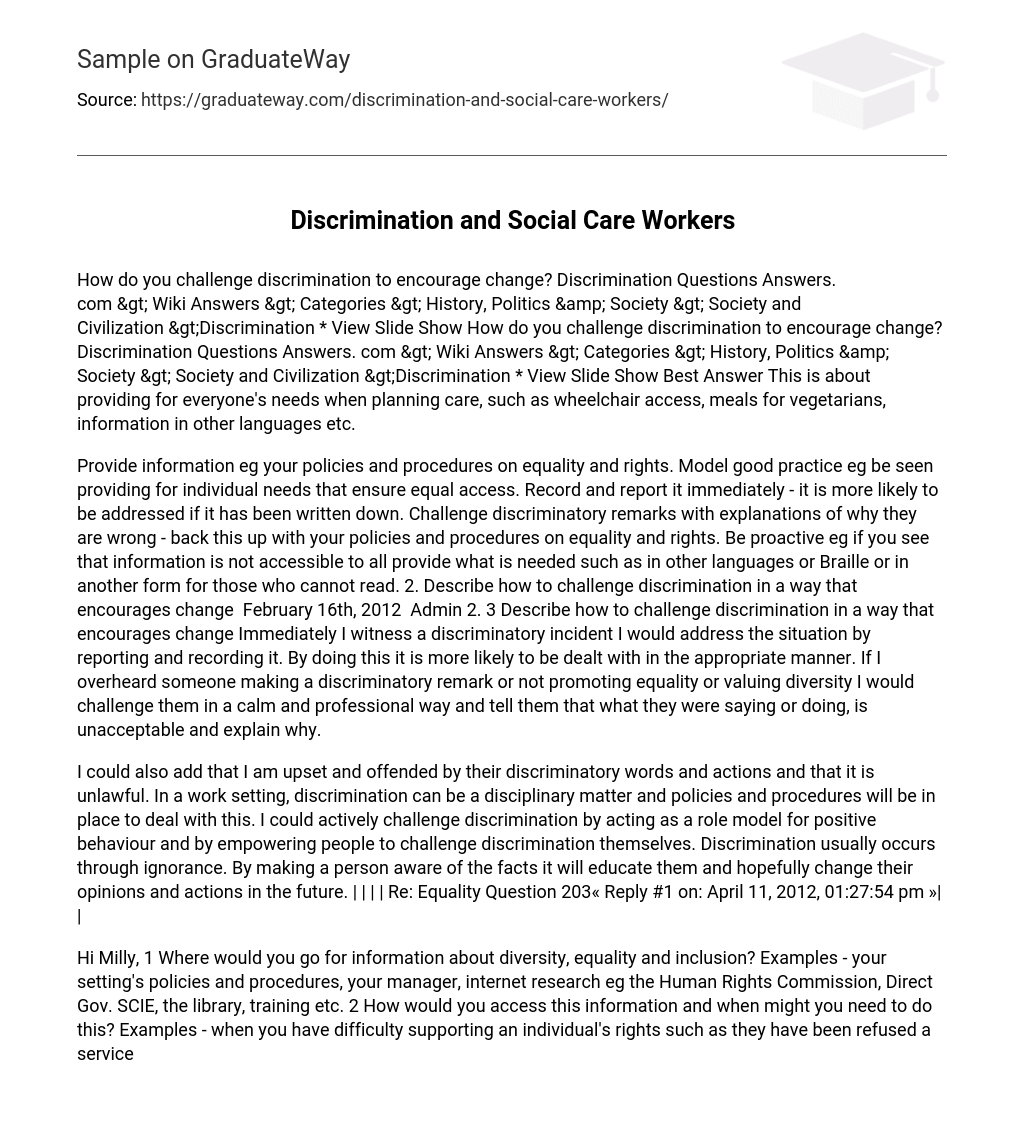How do you challenge discrimination to encourage change? Discrimination Questions Answers. com > Wiki Answers > Categories > History, Politics & Society > Society and Civilization >Discrimination * View Slide Show How do you challenge discrimination to encourage change? Discrimination Questions Answers. com > Wiki Answers > Categories > History, Politics & Society > Society and Civilization >Discrimination * View Slide Show Best Answer This is about providing for everyone’s needs when planning care, such as wheelchair access, meals for vegetarians, information in other languages etc.
Provide information eg your policies and procedures on equality and rights. Model good practice eg be seen providing for individual needs that ensure equal access. Record and report it immediately – it is more likely to be addressed if it has been written down. Challenge discriminatory remarks with explanations of why they are wrong – back this up with your policies and procedures on equality and rights. Be proactive eg if you see that information is not accessible to all provide what is needed such as in other languages or Braille or in another form for those who cannot read. 2. Describe how to challenge discrimination in a way that encourages change February 16th, 2012 Admin 2. 3 Describe how to challenge discrimination in a way that encourages change Immediately I witness a discriminatory incident I would address the situation by reporting and recording it. By doing this it is more likely to be dealt with in the appropriate manner. If I overheard someone making a discriminatory remark or not promoting equality or valuing diversity I would challenge them in a calm and professional way and tell them that what they were saying or doing, is unacceptable and explain why.
I could also add that I am upset and offended by their discriminatory words and actions and that it is unlawful. In a work setting, discrimination can be a disciplinary matter and policies and procedures will be in place to deal with this. I could actively challenge discrimination by acting as a role model for positive behaviour and by empowering people to challenge discrimination themselves. Discrimination usually occurs through ignorance. By making a person aware of the facts it will educate them and hopefully change their opinions and actions in the future. | | | | Re: Equality Question 203« Reply #1 on: April 11, 2012, 01:27:54 pm »| |
Hi Milly, 1 Where would you go for information about diversity, equality and inclusion? Examples – your setting’s policies and procedures, your manager, internet research eg the Human Rights Commission, Direct Gov. SCIE, the library, training etc. 2 How would you access this information and when might you need to do this? Examples – when you have difficulty supporting an individual’s rights such as they have been refused a service because they are in a wheelchair or cannot speak English or are the wrong gender etc. How – first see your policies and procedures then speak to your manager. For general information carry out research.
Hope that helps Aunty Sue Assesment Criteria: 3. 1 Describe situations in which additional information, advice and support about diversity, equality and inclusion may be needed. Answer: There are a variety of different methods of obtaining information on, diversity, equality, and inclusion. You can access government web sites that list all of the current legislations in place to protect the rights of individuals. You can obtain leaflets to give to your service users, to inform them of their rights. You can contact certain groups, such as AGE UK, who can supply materials to hand out to your service user’s on discrimination, equality etc.
You may need such information to help an individual who is seeking advise on a particular subject or if you are trying to obtain information in order to support an individual. clusion means to included everyone within a group not leaving anyone out because of their race, gender ect. It is important that social care workers follow laws, regualtions and codes of practice. List THREE that relate to diversity, equality, inclusion and discrimination 1. Social care workers must protect the rights and look after the intrest or the service user and carers. 2.
Respect different cultures and values. 3. Support anything that happens that is against the law or discrimination against people. Describe TWO situations where you may need to get some support, information or advice about working in a wat that promotes diversity, inclusion and discrimination development 1. If you are unsure of what to do. 2. If it was beyond my job role. For each of the situations you have identified, describe how you could access support, information or guidance In both situations i would look at my policies and procedures and get support from my manager.





